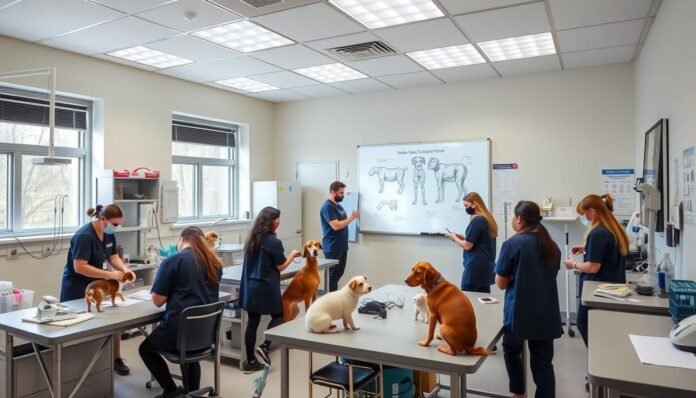Becoming a vet tech is rewarding for animal healthcare lovers. This guide explains the steps to become a vet tech.
We’ll cover schooling length and educational paths, and you’ll learn what it takes to enter this exciting field.
A modern veterinary technician classroom, equipped with animal care stations, veterinary tools, and medical equipment, featuring students engaging in practical training with various animals, a large whiteboard displaying diagrams of animal anatomy, a bright and inviting atmosphere, and natural light streaming through windows.
Vet techs play a vital role in animal care. They assist vets and ensure animal well-being.
Their duties include giving meds and running tests. They also provide nursing care and teach pet owners.
Understanding the Role of a Vet Tech
Vet techs are vital in animal care. They help vets and ensure animals’ well-being in clinics.
Their tasks include handling animals and lab work. Vet techs also communicate with pet owners.
Hands-on animal care is a key duty. This includes restraining animals and giving medicine.
Vet techs also check vital signs. They help with X-rays and collect samples.
Vet techs support clinic operations, too. They maintain lab equipment and process samples.
They often talk to pet owners. Vet techs share info about animal health.
The job needs various skills. These include tech know-how and good communication.
Vet techs must understand animal behavior. They work with vets to give top-notch care.
Educational Requirements for Vet Techs
Vet techs need a strong education. They must finish high school with a focus on science subjects.
After high school, they enroll in a vet tech program. These programs offer training in animal science and hands-on experience.
Students learn about animal anatomy, nursing, and lab procedures. They also study medical terms, drug use, and office management.
Graduates can take the Veterinary Technician National Exam. Passing this exam is key to becoming a licensed vet tech.
Types of Vet Tech Programs Available
Vet tech programs offer many options for aspiring animal care professionals, ranging from associate degrees to bachelor’s programs.
The most common path is an associate degree in vet tech. It is completed in two years at community colleges or vocational schools.
These programs teach animal anatomy, physiology, nursing, and lab procedures. They’re affordable and easy to access for most students.
Bachelor’s degrees in vet tech are available for more in-depth study. These four-year programs cover animal behavior, diagnostic imaging, and management skills.
Online vet tech courses offer flexibility for busy students. They allow them to balance work, family, and school commitments.
Choose AVMA-accredited programs for quality education and better job prospects. These meet high standards for vet tech training.
Typical Duration of Vet Tech Programs
Vet tech programs vary in length. Associate’s degrees take about two years, while bachelor’s degrees take four years.
Some schools offer fast-track options. For students with prior experience, these can be completed in 12-18 months.
All vet tech programs include hands-on animal work. Students learn about animal anatomy and develop essential skills.
They practice lab procedures and surgical assisting. The goal is to prepare students for their future careers.
Accreditation and Its Importance
Accreditation is vital for vet tech schools. AVMA-accredited programs follow strict standards set by the American Veterinary Medical Association.
These programs offer top-notch education for future vet techs. Students learn all they need to excel in their field.
Accreditation helps students in many ways. It ensures they get the best training possible.
Many states require vet techs to graduate from AVMA-accredited programs. This makes graduates more appealing to employers.
A vibrant campus scene of an AVMA-accredited vet tech school featuring modern buildings with veterinary symbols, students interacting with animals in a hands-on learning environment, lush greenery, and a welcoming atmosphere showcasing diverse individuals engaged in veterinary education and animal care.
When choosing a vet tech program, look for the AVMA accreditation stamp. It shows that the school meets high standards.
AVMA-accredited schools offer the best training for vet techs. Students can trust they’re getting an excellent education.
Licensing and Certification for Vet Techs
Becoming a licensed veterinary technician is vital for starting a career. Most states require passing the Veterinary Technician National Exam (VTNE).
State-specific vet tech regulations can differ. Aspiring vet techs should check their state’s requirements.
VTNE preparation often includes completing an accredited program. Hands-on experience through internships or externships is also essential.
After passing the exam, individuals can apply for veterinary technician licensing and start their careers helping veterinarians care for animals.
Staying current with field developments is crucial for vet techs. Continuing education helps maintain licenses and provide the best care.
Understanding licensing helps aspiring vet techs achieve their goals. This knowledge allows them to make a real difference in animal care.
Continuing Education in Veterinary Technology
Vet tech education continues after initial training. Continuing education is vital for career growth and staying current.
CE credits help vet techs improve their skills and provide better patient care. Many states require CE credits for license renewal.
Credits come from approved courses, workshops, and conferences. Topics range from medical procedures to client communication.
CE opens new career doors for vet techs. Specialized certifications can lead to positions in emergency care or anesthesia.
Professional development makes veterinary technicians more valuable in practice and helps them better serve animals and clients.
Career Opportunities for Vet Techs
Vet techs have many exciting career paths to choose from. They can work in clinics or explore specialized areas in animal healthcare.
General practice vet techs assist vets with patient care and lab work. They also educate clients about pet health and wellness.
Vet techs can specialize in emergency care or lab animal medicine. Some even work in zoos with exotic animals.
These jobs may need extra training and certification. But they offer a chance to focus on specific areas.
Vet techs can also work in sales or teaching. They can sell pet medicine or equipment to clinics.
Some teach at vet tech schools. Many animal healthcare job opportunities match your interests.
All veterinary technician career paths help animals and their owners. With the right skills, you can explore various vet tech specialties.
Financial Considerations for Vet Tech Education
Vet tech program costs vary widely. Community colleges often offer more affordable options than private schools.
Financial aid can help with education expenses. Scholarships, grants, and loans are available for aspiring vet techs.
Many schools provide financial aid packages. The AVMA also offers scholarship opportunities for students.
Vet tech salaries differ based on location and experience. In 2021, the median annual wage was $36,260.
Weigh costs, funding options, and potential earnings carefully. This will help you make a wise choice about vet tech education.
Job Outlook and Demand for Vet Techs
Vet tech jobs are growing fast. The U.S. Bureau of Labor Statistics expects a 15% growth from 2019 to 2029.
This growth comes from rising pet ownership. It also stems from new advances in animal healthcare.
The animal healthcare industry is booming. More people own pets and focus on their health.
Vet techs have many job options. They work closely with vets to care for animals.
Rural areas need more vet techs. Specialized fields like emergency care are also growing.
Vet techs with special skills are in high demand. They can expect exciting and varied careers.
Conclusion: Your Path to Becoming a Vet Tech
Becoming a veterinary technician takes dedication but offers great rewards. You’ll make a real difference in the lives of pets and livestock.
Your journey starts with picking the right school program. Look for accredited institutions that match your career goals.
After school, you’ll have the skills to care for animals. You’ll also support their owners through tough times.
Keep learning to stay current in this fast-changing field. Your work will help animals and their human friends.
With hard work, you’ll have a fulfilling career in animal healthcare. Your dedication will improve many lives, both furry and human.
FAQ
How many years of school do I need to become a vet tech?
Most vet tech programs take 2 years to complete. Some schools offer 4-year bachelor’s degree options.
The exact length can vary depending on the program you choose.
What kind of education and training is required to be a vet tech?
You’ll need a 2-year associate’s degree in veterinary technology. The program should be AVMA-accredited.
You’ll learn animal nursing, lab procedures, and medical imaging. Hands-on clinical training is included.
Do I need any prerequisites to enroll in a vet tech program?
Most programs require biology, chemistry, and math courses. Some may ask for animal care experience.
Check the specific requirements for the programs you’re interested in.
What kind of jobs can I get with a vet tech degree?
You can work in clinics, hospitals, or labs. Other options include sales and teaching.
The field offers many chances for those who love animal welfare.
How much can I expect to earn as a vet tech?
Vet techs earn an average of $35,000 to $40,000 per year, but pay varies by location and experience.
The job outlook is good, with faster-than-average growth expected.
you may also read:How to Become a Pharmacy Tech – Career Guide

